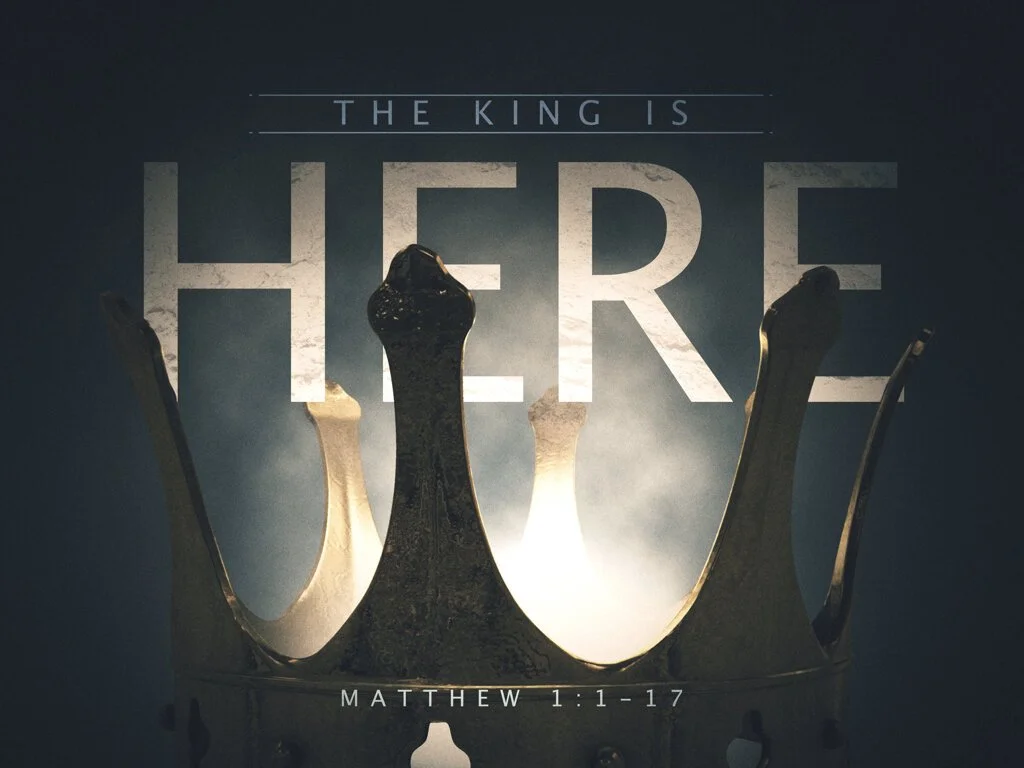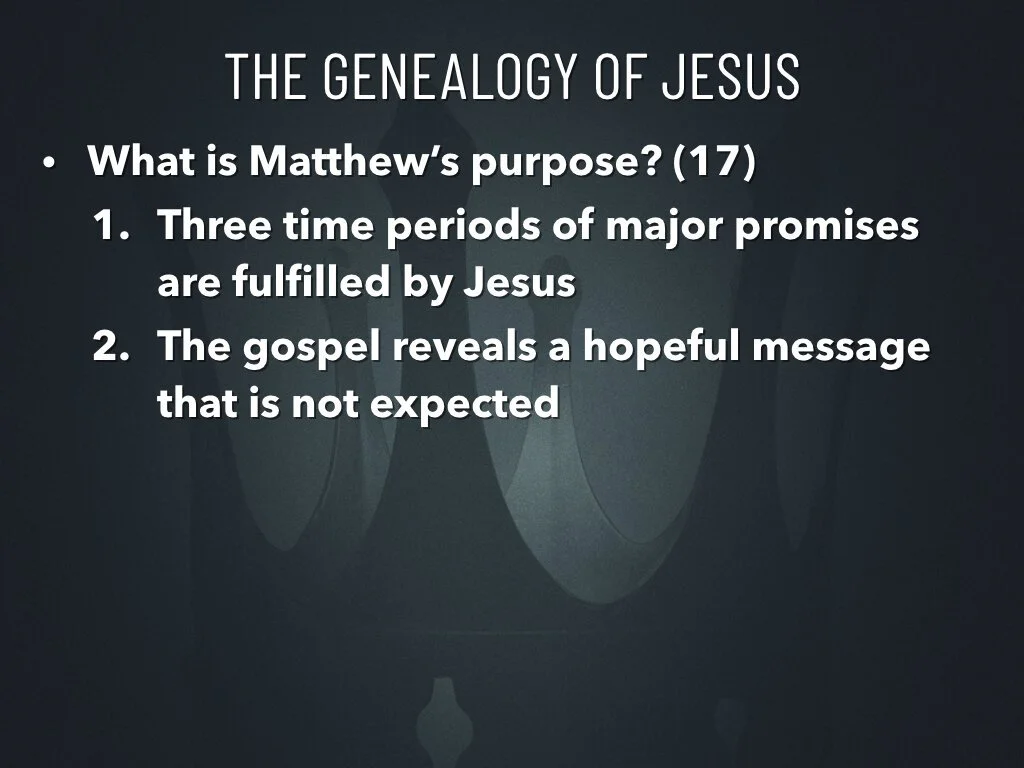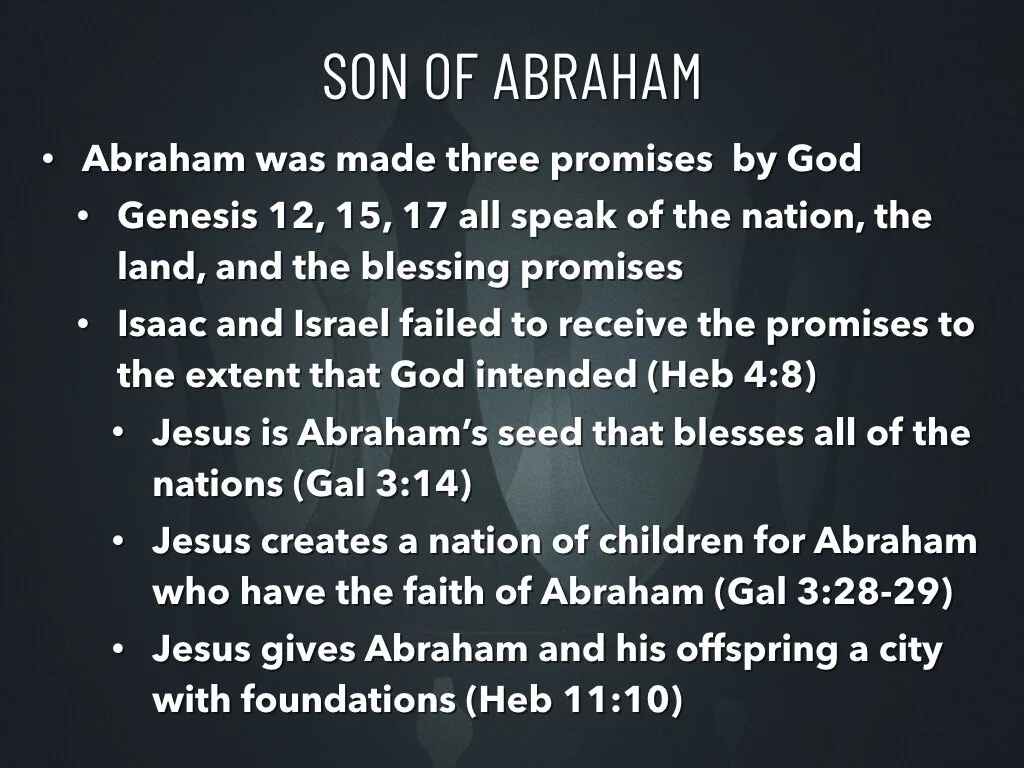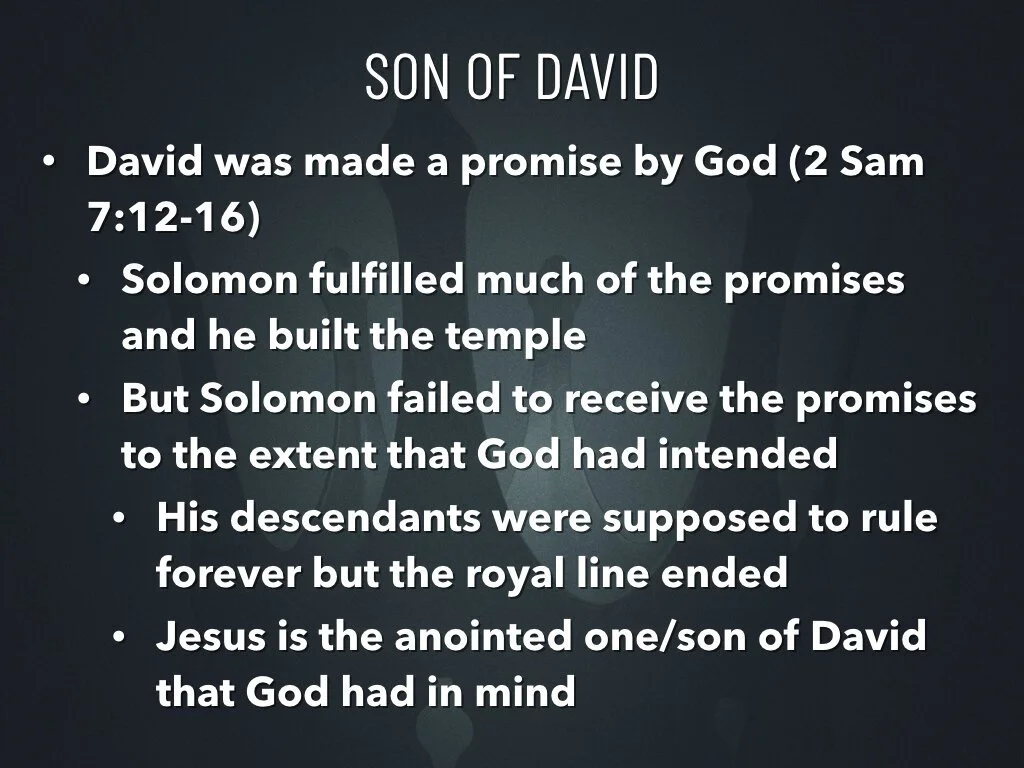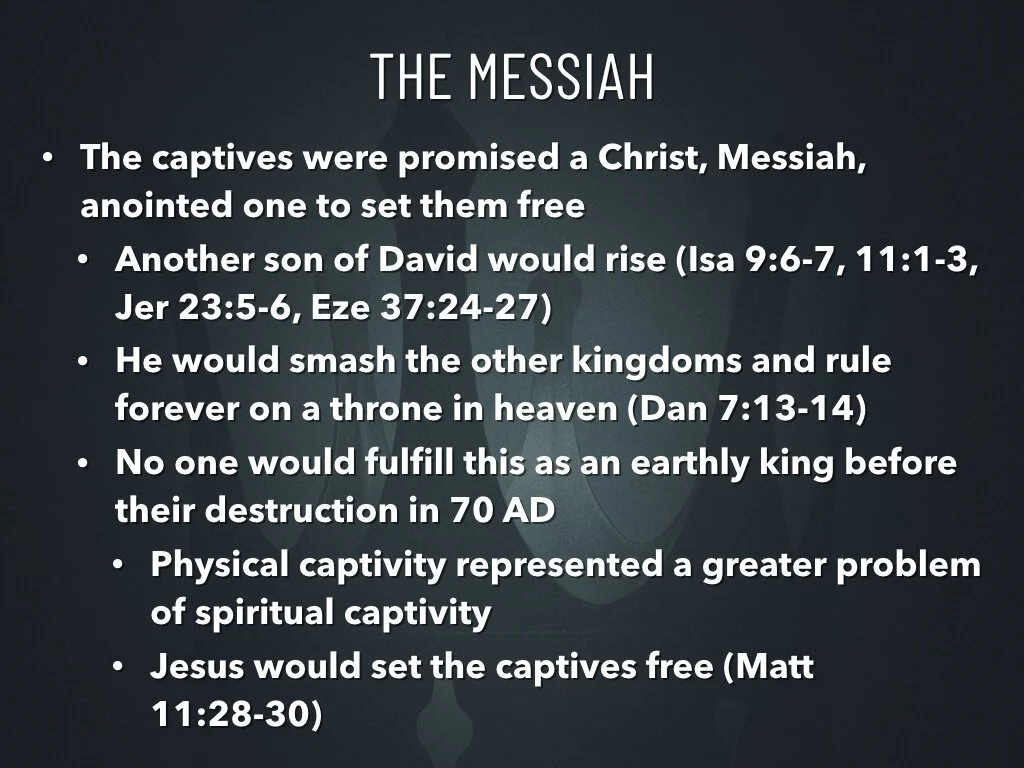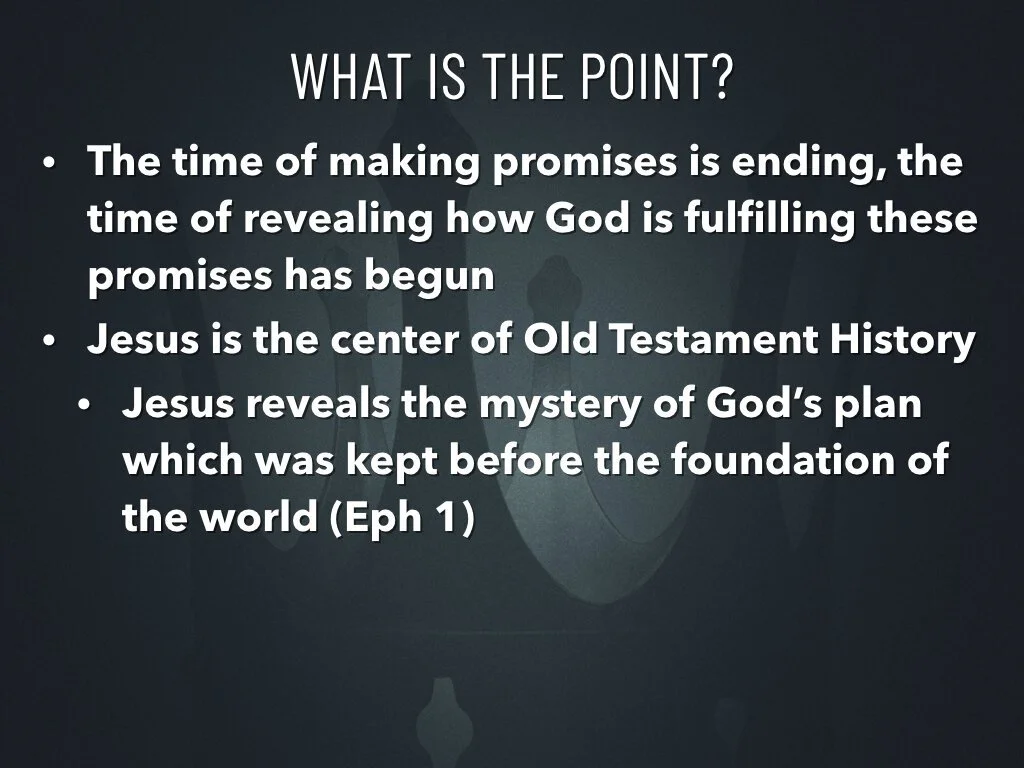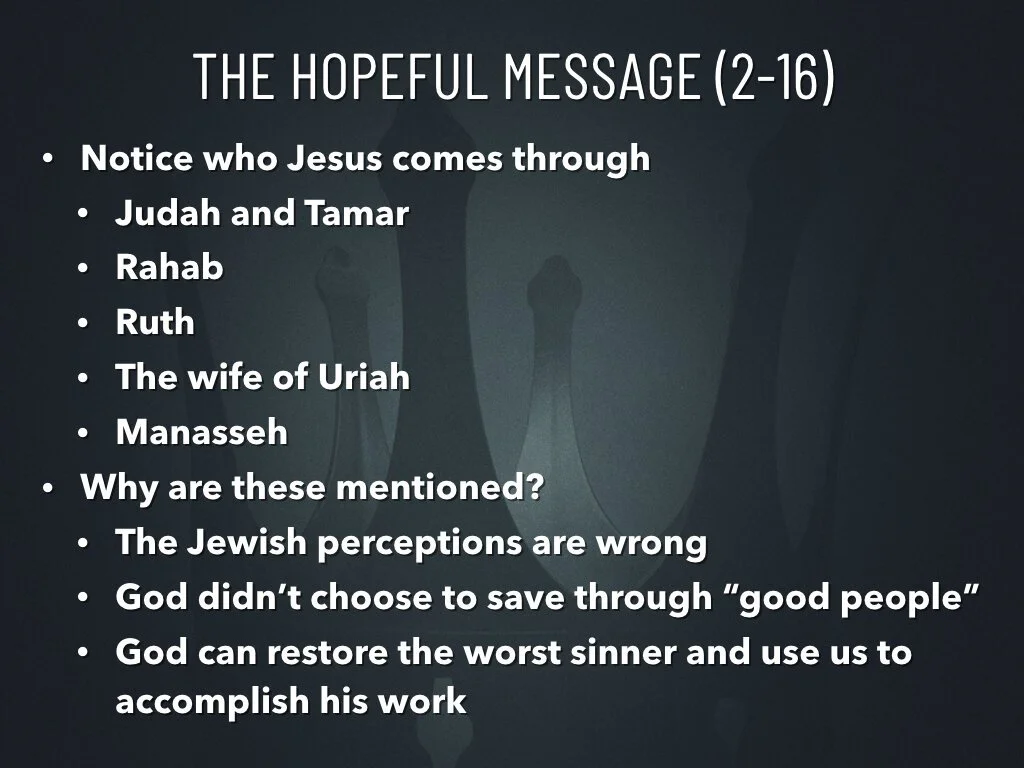The King Is Here (Matthew 1:1-17)
There is only one gospel, but it is revealed to us by many different people. We call the narratives about Jesus' life gospels, but they all contain the same gospel inside. Each of the four books (Matthew, Mark, Luke, and John) are written to describe Jesus' life from a different perspective and for a different purpose. None of them are complete biographies or chronological historical narratives. They are all written by men with a particular goal in mind. That is why we struggle to harmonize the different accounts. They tell the same story for a different reason. History tells us that Mark was written by John Mark, who studied under Peter. The content of Mark tells us that it is a letter that was most likely written to Gentile Christians to have a faith that does not fear. Luke, a Physician who worked with Paul, was writing to give an orderly account of what Jesus did and said to Theophilos, and he would go on in the book of Acts to tell Theophilos the rest of the work of Jesus that he accomplished through his apostles. John tells us plainly in John 20:31, "But these are written so that you may believe that Jesus is the Christ, the Son of God, and that by believing you may have life in his name." John only chose to include a few events that would serve as signs for believers. But what about Matthew?
We are going to spend the next several months looking at the book of Matthew in an attempt to understand what this whole book is about. If I were to summarize this book like I have summarized the other books, I would say that this is a Jewish book written by a Jew to help the Jews understand that Jesus is the king they are looking forward to. Matthew is giving essential facts to help the reader understand who Jesus is from the Old Testament. He is not just trying to provide an orderly account like Luke. In the first two chapters, Matthew describes Jesus' genealogy and infancy. I tried to make the first two chapters fit into one sermon, but that is impossible without cutting critical information. So we are going to see the beginning of Jesus' life in two parts. Today, we will see the genealogy of Christ. Next week, we will see the infancy of Christ.
Overview
In 1:1-17, we see the genealogy of Jesus. When we look at genealogies, we often want to skip through them to get to the storyline. However, Jews paid much attention to the lineages. Matthew and Luke are the only writers who provide genealogy, and Matthew begins his gospel with it. If you go to the Old Testament, you will see many such genealogies. Why? Ultimately, the answer is so that we can have this genealogy. This is the genealogy that God was preparing us for in writing all of the others. Let's read through it together.
Matthew 1:1--17 (ESV) --- 1 The book of the genealogy of Jesus Christ, the son of David, the son of Abraham. 2 Abraham was the father of Isaac, and Isaac the father of Jacob, and Jacob the father of Judah and his brothers, 3 and Judah the father of Perez and Zerah by Tamar, and Perez the father of Hezron, and Hezron the father of Ram, 4 and Ram the father of Amminadab, and Amminadab the father of Nahshon, and Nahshon the father of Salmon, 5 and Salmon the father of Boaz by Rahab, and Boaz the father of Obed by Ruth, and Obed the father of Jesse, 6 and Jesse the father of David the king. And David was the father of Solomon by the wife of Uriah, 7 and Solomon the father of Rehoboam, and Rehoboam the father of Abijah, and Abijah the father of Asaph, 8 and Asaph the father of Jehoshaphat, and Jehoshaphat the father of Joram, and Joram the father of Uzziah, 9 and Uzziah the father of Jotham, and Jotham the father of Ahaz, and Ahaz the father of Hezekiah, 10 and Hezekiah the father of Manasseh, and Manasseh the father of Amos, and Amos the father of Josiah, 11 and Josiah the father of Jechoniah and his brothers, at the time of the deportation to Babylon. 12 And after the deportation to Babylon: Jechoniah was the father of Shealtiel, and Shealtiel the father of Zerubbabel, 13 and Zerubbabel the father of Abiud, and Abiud the father of Eliakim, and Eliakim the father of Azor, 14 and Azor the father of Zadok, and Zadok the father of Achim, and Achim the father of Eliud, 15 and Eliud the father of Eleazar, and Eleazar the father of Matthan, and Matthan the father of Jacob, 16 and Jacob the father of Joseph the husband of Mary, of whom Jesus was born, who is called Christ. 17 So all the generations from Abraham to David were fourteen generations, and from David to the deportation to Babylon fourteen generations, and from the deportation to Babylon to the Christ fourteen generations.
Chances are, many of us were more focused on my ability to pronounce the names than on remembering who these people were. But Matthew has a purpose behind his genealogy. In verse 17 he points out that the distance from Abraham to David is fourteen generations, from David to the deportation was fourteen generations, and from the deportation to the Christ was fourteen generations. He has a purpose here, but what is it? The purpose of this genealogy is twofold. First, he wants to display Jesus as the fulfillment of God's promises by bringing up three periods of great promise. Then, we see a more personal intention as we look at the details in the genealogy.
1. Jesus Is The Fulfillment of God's Promises
Notice that he does not start with Adam. He could have. Luke works his way back from Jesus to Adam. But instead, he begins with Abraham. Why? The answer is in the first verse. The first verse is loaded, and it sets the stage for the Jewish reader. Imagine yourself as a Christian who has been converted out of Judaism. You know your Old Testament, and you have been looking for the promises to be fulfilled all your life just like your ancestors. Or maybe you are not a Christian, but you are a Jew in the first century who wants to understand what Christianity is all about for yourself. Matthew is going to help with that from the very beginning of his account. Let's look at verse 1 backward.
The Son of Abraham
The third fulfillment we read in Matthew 1:1 is that Jesus is the son of Abraham. Abraham was the patriarch who was given the three great promises from God. How many remember those promises? There is the nation promises, the land promise, and the seed promise found in Gen 12, 15, and 17. When Abraham had Isaac, it was a miraculous birth. Abraham was 100 years old, and Sara was 90. But Isaac did not fulfill the promises made by God. Isaac was a lousy father with his wife, Rebecca. They were faithful to God but showed extreme favoritism to their sons, Esau and Jacob. The nation would eventually come from Isaac and through Jacob. They would eventually possess the land and have rest in the time of Joshua, but it was never the nation or the rest in the promised land that God had always intended. It was always providing a temporary rest and security. The seed/offspring of Abraham would be one who blesses all mankind with the removal of the curse (Gal 3:14). The real nation of Israel would be a nation that loves God with all their heart, has the faith of Abraham as Paul said in Galatians 3:28-29, and whom God is not ashamed to call his people. In Hebrews 11:10, we read that Abraham understood the land promise to be about a city with foundations whose designer and builder is God. That place was what Abraham believed God was promising. Jesus is the son of Abraham, according to Matthew. He fulfilled all three of the Abrahamic promises and permanently accomplished them.
The Son of David
Second, he calls him the son of David. This is one of the most important statements in all of Scripture. Matthew is saying that Jesus is the ultimate son of David. He is the one the Jews have been looking forward to. We have to know our Old Testament to grasp the significance of these statements. We are going to look at some of the Old Testament texts this morning to make sure we understand what this means. First, I want us to look at 2 Samuel 7. In this text, David has asked the Lord if he can build a permanent temple in Jerusalem, and the Lord has told him, "No, I never asked any man to build me a temple." God seems satisfied with his tabernacle. But he makes a promise to David.
2 Samuel 7:12--16 (ESV) --- 12 When your days are fulfilled and you lie down with your fathers, I will raise up your offspring after you, who shall come from your body, and I will establish his kingdom. 13 He shall build a house for my name, and I will establish the throne of his kingdom forever. 14 I will be to him a father, and he shall be to me a son. When he commits iniquity, I will discipline him with the rod of men, with the stripes of the sons of men, 15 but my steadfast love will not depart from him, as I took it from Saul, whom I put away from before you. 16 And your house and your kingdom shall be made sure forever before me. Your throne shall be established forever.'"
When we look at this text, we notice that it is referring to Solomon (especially in verse 14). But see the desire of God to establish the throne of David and his kingdom forever. That is emphasized in verses 13 and 16. Though this is a promise made to David that refers to Solomon, Solomon failed to remain faithful. He and the kings who followed turned away from the Lord, which eventually led to the end of the Davidic royal succession. God didn't intend for his anointed one to fail his people. Matthew is pointing out that this text also refers to Jesus. Solomon became a type of Jesus like Moses, Joshua, and David were a type of Jesus.
The Messiah
Now, let's look at the first statement about who Jesus is. Did you catch it? Matthew starts out talking about Jesus as the Christ by saying, "The book of the genealogy of Jesus Christ." Christ is not the last name. It is the same term as Messiah or anointed one. Matthew boldly proclaims from the very beginning that this is about the Messiah, the one whom all of the Old Testament was pointing us toward. Jesus is the guy they were looking forward to. He is the one who will save God's people from their oppression permanently. He is the fulfillment of many Old Testament prophesies that say, "God is faithful, he can judge those who oppose him, and he can save those who turn to him in complete righteousness and holiness through his anointed one."
The Messiah is matched up with the third section of Jesus' genealogy, the deportation to Babylon, which does not have a specific person to reference. In verse 2, he lists Abraham's descendants. In verse 6, Matthew lists David's descendants. Then, in verse 12, he lists those who returned from the deportation to Babylon. This is the third stage of God's promises that Jesus has come to fulfill. The prophets made many promises as they described the Messiah based on the promise to David and Abraham.
Isaiah 9:6--7 (ESV) --- 6 For to us a child is born, to us a son is given; and the government shall be upon his shoulder, and his name shall be called Wonderful Counselor, Mighty God, Everlasting Father, Prince of Peace. 7 Of the increase of his government and of peace there will be no end, on the throne of David and over his kingdom, to establish it and to uphold it with justice and with righteousness from this time forth and forevermore. The zeal of the Lord of hosts will do this.
Isaiah 11:1--3 (ESV) --- 1 There shall come forth a shoot from the stump of Jesse, and a branch from his roots shall bear fruit. 2 And the Spirit of the Lord shall rest upon him, the Spirit of wisdom and understanding, the Spirit of counsel and might, the Spirit of knowledge and the fear of the Lord. 3 And his delight shall be in the fear of the Lord. He shall not judge by what his eyes see, or decide disputes by what his ears hear,
Jeremiah 23:5--6 (ESV) --- 5 "Behold, the days are coming, declares the Lord, when I will raise up for David a righteous Branch, and he shall reign as king and deal wisely, and shall execute justice and righteousness in the land. 6 In his days Judah will be saved, and Israel will dwell securely. And this is the name by which he will be called: 'The Lord is our righteousness.'
Ezekiel 37:24--27 (ESV) --- 24 "My servant David shall be king over them, and they shall all have one shepherd. They shall walk in my rules and be careful to obey my statutes. 25 They shall dwell in the land that I gave to my servant Jacob, where your fathers lived. They and their children and their children's children shall dwell there forever, and David my servant shall be their prince forever. 26 I will make a covenant of peace with them. It shall be an everlasting covenant with them. And I will set them in their land and multiply them, and will set my sanctuary in their midst forevermore. 27 My dwelling place shall be with them, and I will be their God, and they shall be my people.
Daniel 7:13--14 (ESV) --- 13 "I saw in the night visions, and behold, with the clouds of heaven there came one like a son of man, and he came to the Ancient of Days and was presented before him. 14 And to him was given dominion and glory and a kingdom, that all peoples, nations, and languages should serve him; his dominion is an everlasting dominion, which shall not pass away, and his kingdom one that shall not be destroyed.
To the Jew, these are some of the essential texts in the Old Testament. They are looking for a king like David to come and save them from oppression. Matthew says, "The King Is Here!" But as we go through this book, we will see that the king and his kingdom are not what any Jews were expecting. When God's people utterly failed to keep his covenant and received the punishment for their sins, God gave several promises to the remnant that he would come and take care of their most pressing need, SIN. He establishes a new covenant with them, setting the captives free and giving rest to their souls. We could look at more than thirty promises from God, but time will not allow.
Jesus Is The Center of History
The point of this is to say that Jesus is what all of history has been leading to. Matthew wanted his readers to see that through Jesus, God was bringing about the ultimate fulfillment of the Old Testament. The time of making promises has ended, and the time of revealing how God plans to provide those promises has come. What a great time to be alive. We get to see the things that angels longed to see. We get to understand how our God worked out the redemption of a sinful people who would be transformed from one degree of glory to another as we behold the face of Jesus, our blessing, king, and Messiah.
A More Personal Intention
The last thing I want you to do as you leave this morning thinking, "That is all a bunch of great information, but what am I supposed to do with that?" I want you to understand what the first 17 verses of Matthew means to each of us individually before we go.
God Works Through Sinful Men
First, notice some of the names in the genealogy. The names of the women are essential, as well as the names of the men. Leading up to the great king David, we have Judah and Tamar, who were together because of Judah mistreating Tamar and Tamar, deceiving Judah by acting like a prostitute. Then, we skip ahead to verse 5, where we see Rahab, a prostitute from Canaan, and Ruth, a Moabite who was not supposed to be allowed to enter Israel by the command of God. These three women do not have a stunning reputation, but at least Rahab and Ruth showed faith in God. Then, we get to verse 6, where we read about the wife of Uriah, who committed adultery and was the mother of Solomon. There is nothing squeaky clean about this genealogy. Later on, we see Manasseh, who was the worst king Judah had ever known. Yet, Matthew brings all of these people to the forefront for a reason. God can bring those who seem the furthest away from him back into the fold and use them to glorify his name. Matthew, the tax collector, will touch on this throughout his gospel. He sets it up here in the very beginning. Jews must get over their self-righteous tendencies and recognize that Jesus came to save us, not because we are great people, but because God loves us, and he wants us.
We have the greatest blessing that could every be provided in Jesus. We have an eternal king who rules with justice and equity. We are set free from the sin and death that we deserve through his atoning sacrifice. This is good news for all of humanity.

